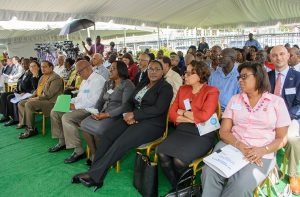THE United Nations Multi-country Sustainable Development Framework (UN-MSDF) 2017-2021 was launched here on Friday with this country becoming the first among 18 nations and territories in the Caribbean to sign onto the Country Implementation Plan.
MSDF, which is in the process of replacing the United Nations Development Assistance Framework (UNDAF), is the collective response of the UN system to support the achievement of national development priorities.
On Friday, the Country Implementation Plan (CIP) was signed by the UN Resident Coordinator Mikiko Tanaka and Finance Minister Winston Jordan, at the Public Buildings in the presence of Prime Minister, Moses Nagamootoo; FAO Country Representative, Reuben Robertson; Ministers of Government; Speaker of the National Assembly, Dr Barton Scotland; and Members of the Diplomatic Corps among others.
In addressing the gathering, the UN Resident Coordinator explained that the launch of MSDF paves the way for the formal introduction of the UN’s “Delivering as One” approach in Guyana and by extension the Caribbean.
She said the complexities of developmental challenges and the declining trends of traditional official development aid create a clear case for the use of the “Delivering as One” approach. Additionally, the regional framework will also allow for the UN to collaborate with regional bodies such as the Caribbean Community (CARICOM) to tackle common challenges within the Region.
In Guyana, the UN country team will work with the Government through CIP to achieve four objectives in keeping with the Sustainable Development Goals (SDGs): an inclusive, equitable and prosperous Guyana; a safe, cohesive and just Guyana; a healthy Guyana; and a sustainable and resilient Guyana.
Through “Delivering as One,” the UN will work with the Government to tackle multidimensional developmental issues Tanaka emphasized, while taking note of the fact that poverty, hunger, inequality, insecurity, unemployment, educational under performance have deep and complex root causes, and must be tackled holistically.
As such, through CIP, the multiple challenges facing the most disadvantaged, vulnerable and marginalised groups of people will be addressed by providing them with opportunities and services that will allow them to fulfil life’s potential.
These groups include families in poverty, adolescent and single mothers, disadvantaged children and youth, indigenous peoples, persons living with HIV and AIDS, people living with disability, elderlies, the LGBTs, victims of abuse, violence and trafficking, the UN Resident Coordinator explained.

“Resolving these issues requires coordinated actions between line ministries and other institutions, nationally, regionally and locally. The UN system will work together with the Government to embed multidimensional approaches in developing policies such as the green state development strategy,” she explained.
Additionally, the UN system will jointly strengthen data systems in Guyana for evidence-based policy-making, planning, monitoring and reporting.
“The 17 SDGs each have a set of global indicators that are yet to be embedded in national plans. This should be a meaningful exercise that enables the Government to target, deliver and report results through their normal work,” she added.
Prime Minister Nagamootoo, in his address, said the Government remains thankful to the United Nations Development Programme (UNDP) for its continuous support, noting that the UN-MSDF will [aid] the Government in achieving its goal to provide a “good life for all.”
“The aim of the UN MSDF is to ensure that no one is left behind in national development efforts, and exemplifies the commonly shared belief that the similar development challenges of the Caribbean countries require a coherent and coordinated response by the United Nations.
Moreover, the UN MSDF acts as a mechanism that would decrease the administrative burden on national governments and prompt a more coherent response to regional and national challenges, needs, and priorities,” the Prime Minister said.
Guyana, he pointed out, is a signatory to the Paris Agreement on Climate Change and has also adopted the 2030 Sustainable Development Agenda which provides a framework for the realization of the Green Economy.
As such, the Government will work to ensure that the country’s resources are developed and utilised in a responsible manner that ensures optimum sustainability, even as it meets the needs of its people.
“I can assure you that the Government of the Cooperative Republic of Guyana is committed to delivering results together with the UN for all the people of Guyana. The pursuit of the Green Economy and the SDGs will require the participation of all stakeholders to make Guyana a better place for all Guyanese.”
The Finance Minister, who signed the agreement on behalf of Guyana, explained that by adopting the “Delivering as One” approach, Guyana is now poised to reap the benefits of the combined ideas, skills, capacities, and institutional experiences to be provided by the UN family and the Caribbean.
He posited that development framework is designed to provide member states with the necessary tools, partnerships and resources needed to achieve national and sub-regional priorities in an inclusive and equitable manner.
He said very soon, the Government will pilot a green development programme for multi-dimensional poverty reduction in Regions One, Five, Nine and 10, and already, the UN Country team has been engaged at the various levels.
The MSDF will cover the UN System across Barbados and the OECS, Belize, Guyana, Jamaica, Suriname and Trinidad and Tobago and their participating governments. It is based on the Common Multi-Country Assessment (CMCA) which is an analysis of regional and national priorities, within the context of the SDGs.



.jpg)








